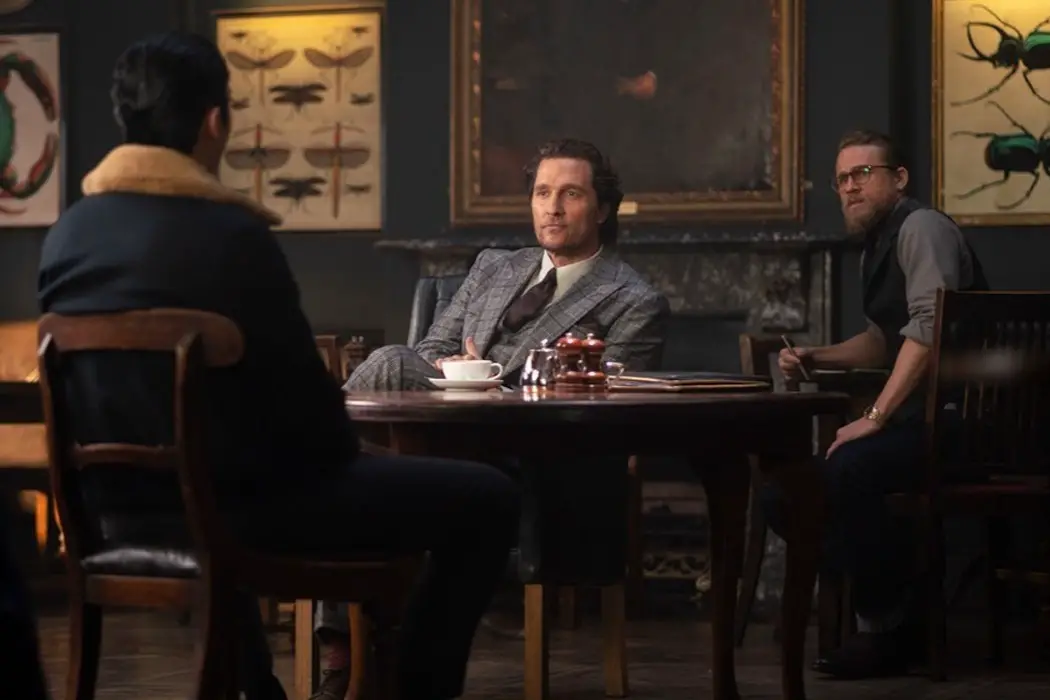THE GENTLEMEN: Guy Ritchie’s Return To Form

Alex is a 28 year-old West Australian who has a…
A cheeky, old-fashioned return to form, The Gentlemen arrives at the right time in Guy Ritchie’s career, who, like many of the underdogs he’s comically sketched in the past, has always managed to get up after a knockout blow. When his pair of British crime capers released post-Pulp Fiction – Lock, Stock and Two Smoking Barrels and Snatch – they heralded the arrival of a new, suave film-maker who could guarantee a good time in the multiplex. And then to begin this swaying arc, Swept Away happened, a poetic title in hindsight as the Madonna-adorned misfire quickly extinguished the flames of the newly-minted outsider.
It’s this constant rise-and-fall that would curiously define the director’s volatile career: for every Sherlock Holmes, there was a King Arthur. As his 90’s contemporaries have diverted into more retrospective, graceful material (pairing this with Tarantino’s Once Upon a Time in Hollywood brings forth a stark departure in aspiration), Ritchie’s fourth retreat towards the world of corner-store criminals feels more like a personal reclamation of personality rather than an act of hedging bets.
Back to the Beginning
In the wake of the soulless, passenger-seat-direction of his live-action remake of Aladdin, The Gentlemen arrives with a distinct feeling of recovery, the same rehabilitating vibe that tinged Jon Favreau’s post-Iron Man 2 endeavour Chef, which made its intentions fairly explicit when the MCU-originator furiously withdrew from his cushy job of “doing what the menu says” in order to make cubanos in a food van.

While Ritchie has never been the type to go “back to basics” (Revolver being the closest attempt at this), there is a genuine cinematic comfort in seeing his career boomerang back to the beginning. Despite the phrase “for the fans” being metastasised into a flimsy defence for subpar franchise material, this film immediately rebuffs anyone indifferent to his signature style, relying on his decades-old tropes of self-referential mobsters tangling webs in greedy pursuits for lifted trinkets – but in spite of this, there is an unfamiliar element smuggled into this familiar banquet.
This germ of an idea is that, whilst simultaneously being a homage to Ritchie’s own role in British film history, this is ultimately an ode to another crime classic; The Long Good Friday. In John Mackenzie’s jet-black masterpiece, the c*ckney crime boss Bob Hoskins’ attempts at legitimacy were sabotaged by foreign forces, sending him on a self-inflicted path to destruction. Riddled with more smash and grab sarcasm, Ritchie’s screenplay positions American ex-pat Mickey Pearson (a restrained Matthew McConaughey) in the same apocalyptic scenario and watches as his own dominos fall out of favour.
A League of Gentlemen
In the realm of film, there seems to be only two destinations for career criminals; the throne or the grave. Pearson, a self-made millionaire who heralds a secret formula for harvesting mountains of marijuana, wants to pursue the third, often elusive alternative: retirement with his high-class wife Rosalind (Michelle Dockery) His plan is simple: sell his stock and farming secrets to his rich companion Matthew (Jeremy Strong), but no 9 digit transaction is ever that easy, and when the “king of the jungle” is targeted by a gang of GoPro-wearing rappers – led by the pragmatic Colin Farrell – this debt, as you can assume, must be payed in blood.
As Ritchie has never been the one to step in front of the camera, Hugh Grant – furnished with the wardrobe of a charity store Tony Stark – inhabits the role of the director’s stand-in, narrating this tangled network of feuding crooks in a gleeful manner that one imagines mirrors Ritchie’s own funding pitch for the film. Not only does he outline the multiple strands into one cohesive timeline for Pearson’s steadfast assistant Raymond (Charlie Hunnam) – and soliciting a blackmail payout for the hot info – but he’s virtually connecting the dots for us and having a hell of a time playing God.

Thrown into this boiling pot is rising star Henry Golding, effectively the only major character designated with a quirky gangster nickname: Dry Eye. Grant recounting that he looks like a Chinese James Bond, with a “Rice-nce to Kill” will cause many to raise an eyebrow, a dated crack that definitely undercuts his handsomely violent entrance. Always able to draw out terrific performances from his ensembles, Hunnam gets to play the straight man to the circle of diverse personalities that beseige the drug empire he keeps in control.
If one were to select a stand-out, it would be Colin Farrell’s hard-headed school counsellor Coach, who exudes the same level of cutting Irish wit that he sharpened in his esoteric work with Yorgos Lanthimos and Martin McDonagh. Ritchie may lack the visual flourish of someone like Lanthimos, but his ability to innovate his aesthetics with whirring on-screen text, sleek info-graphs and Alan Stewart’s kinetic camerawork always compels the audience to pay attention to the unfolding chaos.
The Gentlemen: Conclusion
The Gentlemen is certainly the cinematic rejuvenation that Guy Ritchie required if he wants to continue his storied career; when Hugh Grant valiantly rants that his story “ain’t TV”, but “is cinema” without a single character “on a memory stick”, we realise that this isn’t just another film about a gangster’s squabbles, but rather an exorcism of his past, culminating in the realisation that his strengths lie in back-alley lawbreakers, not digital blue genies.
Between this and next year’s bluntly-titled Cash Truck, let’s hope Guy Ritchie stays in the food van making cubanos a little while longer.
What are some of your favourite Guy Ritchie films?
The Gentlemen comes out in Australian cinemas on New Years Day, with a US release dated for January 24th 2020.
Does content like this matter to you?
Become a Member and support film journalism. Unlock access to all of Film Inquiry`s great articles. Join a community of like-minded readers who are passionate about cinema - get access to our private members Network, give back to independent filmmakers, and more.













